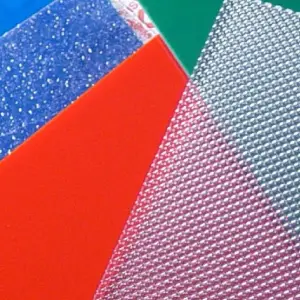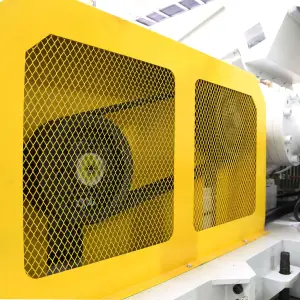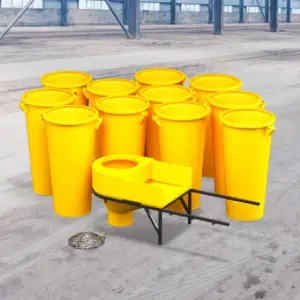

Acrylic & Perspex Sheets
Acrylic Plastic sheets are a type of plastic material made from a synthetic polymer known as polymethyl methacrylate (PMMA). These sheets are widely recognized for their exceptional clarity, strength, and versatility. Often referred to as “plexiglass” or “acrylic glass,” acrylic sheets are a lightweight and shatter-resistant alternative to glass.
Acrylic & Perspex Sheets
Acrylic sheet is a widely used display material. Cast, extruded, mirrored, and acrylic is all available from Petron Thermoplast in a variety of colors, sizes, and thicknesses.
Acrylic sheets are easier to machine, cut, drill, polish, manufacture and mold when compared to other polymers. In addition, the material has excellent UV resistance and chemical resistance.
Genuine Acrylic sheets are a high-end type of cast acrylic that offers long-term weather resistance, no color discoloration, and more than 92 percent visible light transmission. Casting against a glass produces a high-quality surface that should be utilized when light and weathering are significant considerations. Acrylic sheet has a lesser impact strength than comparable technical plastics like Polycarbonate.
Key Features
- Excellent optical properties.
- Temperature: Up to +80°C.
- Lightweight.
- Good resistance to chemicals.
- Approved for food contact.
Standards
- Conforms to ISO 9001:2008 quality standards and ISO 14001:2004 environmental standards.
- Suitable for use with foodstuffs in accordance with European Directive 96/11/CEE.
Manufacturing Process of Acrylic Sheets
The manufacturing of acrylic sheets typically involves either extrusion or casting, two distinct processes that each produce high-quality sheets with unique characteristics. Below is an overview of both methods:
1. Extrusion Process
The extrusion process involves the continuous production of acrylic sheets by forcing melted acrylic resin through a die.
Step 1: Resin Melting
Acrylic resin (polymethyl methacrylate, or PMMA) in the form of pellets is fed into an extruder. The resin is heated until it melts and forms a viscous liquid.
Step 2: Extrusion
The molten acrylic is pushed through a die, which shapes the material into thin, flat sheets. The thickness of the sheet is determined by the die and can be adjusted as needed.
Step 3: Cooling
Once the acrylic exits the die, it passes through a series of rollers to maintain its shape and ensure uniform thickness. The sheet is then cooled, either by air or water, solidifying into its final form.
Step 4: Cutting and Finishing
The cooled sheet is cut to size and may undergo additional finishing processes such as edge trimming, surface polishing, or protective film application.
2. Casting Process
The casting process involves pouring liquid acrylic between two glass plates to form the sheets.
Step 1: Mold Preparation
Glass molds or plates are prepared with spacers between them to determine the thickness of the acrylic sheet. These molds are carefully cleaned to ensure a smooth surface finish on the final injection molding product.
Step 2: Monomer Mixing
Liquid acrylic monomer, combined with initiators and other additives, is prepared in a mixing vessel. The mixture may be colored or contain other properties to suit specific applications.
Step 3: Pouring
The liquid acrylic is poured into the mold, filling the space between the glass plates.
Step 4: Polymerization and Curing
The filled mold is placed in a controlled environment, typically an oven, where the acrylic monomer undergoes a chemical reaction called polymerization. This process can take several hours or even days, depending on the thickness of the sheet.
Step 5: Demolding and Finishing
Once the acrylic has fully cured, the glass molds are removed, and the sheet is taken out. The sheet is then trimmed, polished, and finished to meet required specifications.
Applications of Acrylic Sheet (Polymethyl Methacrylate (PMMA))OR Perspex Sheet
1. Architecture and Construction
- Windows and Skylights
- Partitions and Barriers
- Signage and Display Panels
2. Automotive and Transportation
- Windshields and Windows
- Instrument Panels and Dashboard Components
- Headlights and Taillights
3. Medical and Healthcare
- Medical Equipment Housings
- Protective Barriers
- Dental and Orthodontic Appliances
4. Retail and Point-of-Sale Displays
- Display Cases and Shelving
- Point-of-Sale Stands and Holders
5. Home and Interior Design
- Furniture
- Decorative Panels
- Aquariums
6. Lighting and Optics
- Light Diffusers and Lenses
- Signs and Displays
7. Art and Design
- Sculptures and Installations
- Picture Frames and Mounts
8. Aerospace and Marine
- Aircraft Canopies and Windows
- Boat Windows and Windshields
9. Electronics and Technology
- Screen Protectors and Enclosures
- Lenses and Light Guides
10. Safety and Protection
- Bulletproof Shields
- Protective Barriers
Properties of Acrylic Plastic Sheets
1. Optical Clarity
- High Transparency
- Non-Yellowing
2. Impact Resistance
- Shatter-Resistant
3. Lightweight
- Half the Weight of Glass
4. Weather Resistance
- UV Stability
- Durability in Harsh Environments
5. Chemical Resistance
- Resistant to Many Chemicals
6. Thermal Properties
- Moderate Heat Resistance
- Thermo formable
7. Scratch Resistance
- Moderately Scratch-Resistant
8. Workability
- Easily Machined and Fabricated
- Polishable
9. Electrical Insulation
- Good Electrical Insulator
10. Color Availability
- Available in a Wide Range of Colors
11. Surface Finish
- Smooth Surface
12. Recyclability
- Eco-Friendly and Recyclable
13. Low Moisture Absorption
- Moisture Resistant
[3d_viewer id=158339]
[3d_viewer id=158344]
[3d_viewer id=158348]
Petron Thermoplast - Best Acrylic Plastic Sheet Manufacturer OR Supplier
Petron Thermoplast is a leading manufacturer and supplier of high-quality acrylic plastic sheets. With a strong commitment to innovation, precision, and customer satisfaction, Petron Thermoplast stands out as a trusted name in the industry. Here’s why Petron Thermoplast is the best choice for Acrylic Parts Supplier:
1. Superior Quality Products
Petron Thermoplast offers acrylic sheets with exceptional transparency and clarity, perfect for applications requiring a crystal-clear finish.
2. Diverse Range of Applications
Petron Thermoplast supplies acrylic sheets for a wide range of industries, including signage, construction, automotive, medical, and interior design.
3. Advanced Manufacturing Process
Petron Thermoplast utilizes cutting-edge technology and modern precision machined components manufacturing techniques to produce acrylic sheets that meet international quality standards.
4. Exceptional Customer Service
Petron Thermoplast works closely with clients to understand their requirements and provide personalized solutions to meet their needs.
5. Competitive Pricing
Petron Thermoplast provides high-quality acrylic sheets at competitive prices, offering excellent value for money while maintaining premium quality.
6. Sustainability Commitment
The company is dedicated to sustainability and ensures that their manufacturing processes minimize waste and environmental impact. Their acrylic sheets are fully recyclable, making them an eco-conscious choice.
By choosing Petron Thermoplast as your acrylic plastic sheet manufacturer and supplier, you are guaranteed quality, reliability, and exceptional service. Whether you need standard sheets or custom solutions, Petron Thermoplast is your go-to source for top-tier acrylic materials that meet your exact specifications.
Acrylic Sheet – High Quality Material
Acrylic sheets, commonly known as Polymethyl Methacrylate (PMMA), are renowned for their high quality, versatility, and exceptional performance across various industries. As a premium material, acrylic offers a wide array of benefits that make it the preferred choice for both commercial and industrial applications.
Key Attributes of High-Quality Acrylic Sheets
- Exceptional Clarity and Transparency
- Lightweight Yet Strong
- Weather Resistance
- Thermoformable and Machinable
- Scratch Resistance
- Chemical Resistance
- Eco-Friendly and Recyclable
List of Top Acrylic Sheets/Perspex Sheets Available
Acrylic sheets (also known as Perspex sheets or PMMA sheets) are available in various grades, types, and brands, each offering unique properties suited to different applications. Here is a list of some of the top acrylic sheet brands and types:
- Plexiglas by Evonik
- ACRYLITE by Mitsubishi Chemical
- Perspex by Lucite International
- OPTIX by Plaskolite
- ALTUGLAS by Arkema
- PALSUN by Palram
- LuciteLux by Lucite International
- Polycast by Spartech
- Acrylite Heatstop
- Evonik Plexiglas Satinice
Types of Acrylic Sheets
Acrylic sheets come in various types, each with unique properties tailored for specific applications.
Here’s an overview of the different types of acrylic sheets:
- Cast Acrylic Sheets
- Extruded Acrylic Sheets
- Impact Modified Acrylic Sheets
- UV-Resistant Acrylic Sheets
- Anti-Static Acrylic Sheets
- Abrasion-Resistant Acrylic Sheets
- Light Diffusing Acrylic Sheets
- Mirrored Acrylic Sheets
- Textured Acrylic Sheets
- Colored Acrylic Sheets
- Frosted Acrylic Sheets
- Solar-Tinted Acrylic Sheets
- Fluorescent Acrylic Sheets
- High-Impact Acrylic Sheets
- Anti-Glare Acrylic Sheets
- Bullet-Resistant Acrylic Sheets
Advantages of Acrylic (Polymethyl Methacrylate (PMMA)) Sheet OR Perspex Sheet
Acrylic sheets, commonly known as PMMA or Perspex, are highly versatile and offer numerous advantages over other materials. Below are the key benefits:
• Exceptional Optical Clarity
• Lightweight
• Impact Resistance
• Weather Resistance
• Easy to Fabricate
• Thermoformable
• Chemical Resistance
• Color Options
• Cost-Effective
• Recyclable
• Scratch Resistance (with coatings)
• Flame Resistance
Sizes and Thickness of Acrylic Sheet
Acrylic sheets are available in a variety of sizes and thicknesses to accommodate different applications. The dimensions and thicknesses can vary by manufacturer and specific product type. Here’s a general guide to the common sizes and thicknesses of acrylic sheets:
Standard Sizes
1. Sheet Dimensions:
Standard Sheets: Commonly available in sizes such as 4′ x 8′ (1220mm x 2440mm) and 4′ x 10′ (1220mm x 3050mm).
Custom Sizes: Many suppliers offer custom-cut acrylic sheets to specific dimensions according to customer requirements, including both larger and smaller sizes.
2. Thickness Options:
Thin Sheets: Typically range from 1/16 inch (1.5mm) to 1/8 inch (3mm).
Medium Sheets: Common thicknesses are 1/4 inch (6mm) and 3/8 inch (9mm).
Thick Sheets: Available in thicknesses of 1/2 inch (12mm), 3/4 inch (19mm), and up to 1 inch (25mm) or more, depending on the application and strength requirements.
Specialty Sizes and Thicknesses
1. Large Format Sheets:
Some manufacturers offer larger formats, such as 6′ x 10′ (1830mm x 3050mm) or even custom sizes up to 8′ x 12′ (2440mm x 3660mm).
2. Custom Thickness:
Acrylic sheets can be produced in custom thicknesses beyond standard options, depending on specific application needs and manufacturing capabilities. This includes very thin sheets for applications like signage and thicker sheets for structural components.
Why Choose Acrylic Sheets from Petron Thermoplast?
Petron Thermoplast is a leading provider of high-quality acrylic sheets, known for their superior performance and reliability. Here’s why you should choose acrylic sheets from Petron Thermoplast:
- Exceptional Quality
- Extensive Range of Options
- Advanced Manufacturing Technology
- Competitive Pricing
- Excellent Customer Service
- Versatility and Customization
- Sustainable Practices
- Proven Reliability
Conclusion
Choosing acrylic sheets from Petron Thermoplast ensures that you receive products of the highest quality and reliability. In summary, Petron Thermoplast combines expertise, innovation, and customer-centric service to deliver acrylic sheets that excel in performance and aesthetic appeal. Trust them for your acrylic needs and experience the difference in quality and service that sets them apart.
FAQs
1. What are acrylic sheets made of?
Acrylic sheets are made from Polymethyl Methacrylate (PMMA), a type of thermoplastic that is known for its clarity, strength, and versatility. PMMA is a polymer produced by polymerizing methyl methacrylate monomers.
2. What are the main types of acrylic sheets?
The main types of acrylic sheets include:
• Cast Acrylic Sheets: Made by pouring liquid acrylic into molds. Known for high clarity and durability.
• Extruded Acrylic Sheets: Produced by pushing acrylic through rollers. Generally less expensive and uniform in thickness.
• Impact-Modified Acrylic Sheets: Enhanced with polymers to increase impact resistance.
• UV-Resistant Acrylic Sheets: Treated to withstand ultraviolet light and prevent yellowing.
3. What thicknesses are available for acrylic sheets?
Acrylic sheets are available in a range of thicknesses, typically from 1/16 inch (1.5mm) to 1 inch (25mm) or more. Common thicknesses include 1/8 inch (3mm), 1/4 inch (6mm), and 1/2 inch (12mm).
4. How are acrylic sheets fabricated?
Acrylic sheets can be cut, drilled, bent, and thermoformed using standard fabrication techniques. They can also be polished to achieve a smooth, clear finish. Special tools and methods may be required for custom shapes and complex designs.
5. Can acrylic sheets be used outdoors?
Yes, acrylic sheets are suitable for outdoor use due to their resistance to UV rays and weather conditions. UV-resistant acrylic sheets are specifically designed to prevent yellowing and degradation over time.
6. Are acrylic sheets recyclable?
Yes, acrylic sheets are recyclable. They can be reprocessed into new acrylic products, helping to reduce environmental impact. Ensure to check with local recycling programs for proper disposal and recycling options.
7. Can acrylic sheets be tinted or colored?
Yes, acrylic sheets are available in various colors and finishes, including transparent, translucent, frosted, and mirrored options. Custom colors can also be achieved through specific manufacturing processes or coatings.
8. How do I choose the right acrylic sheet for my project?
Consider the following factors:
• Application Requirements: Determine the necessary thickness, color, and type based on the specific use.
• Environmental Conditions: Choose UV-resistant or weather-resistant options for outdoor applications.
• Fabrication Needs: Ensure the sheet can be easily cut, drilled, and shaped according to your project requirements.
Availability
Clear acrylic is supplied as standard. We offer an extensive range of colours, please refer to the ‘Cast Acrylic Colour Chart’ below and state the colour you require upon enquiry.
Also available: Acrylic (Perspex®) Rod and Acrylic (Perspex®) Tube.
| Sheet Size (mm): | Sheet Thickness (mm): |
|---|---|
| – | 2 3 4 5 6 8 10 12 15 20 25 30 40 50 60 |
| 3000 x 2000 | * * * * * * * * * * * * – – – |
| 2000 x 1500 | * * * * * * * * * * * * – – – |
| 2000 x 1250 | – – – – – – – – – – – – * * * |
Availability
| Sheet Size (mm): | Sheet Thickness (mm): |
|---|---|
| – | 1 1.5 2 2.5 3 4 5 6 8 10 12 15 20 25 |
| 3000 x 2000 | – – * * * * * * * * * * * * |
| 2500 x 2000 | – – – * * * * * * * – – – – |
| 2500 x 1200 | – * – – – – – – – – – – – – |
| 2000 x 1500 | – – * – * * * * * * * * * * |
| 1250 x 1200 | * – – – – – – – – – – – – – |





